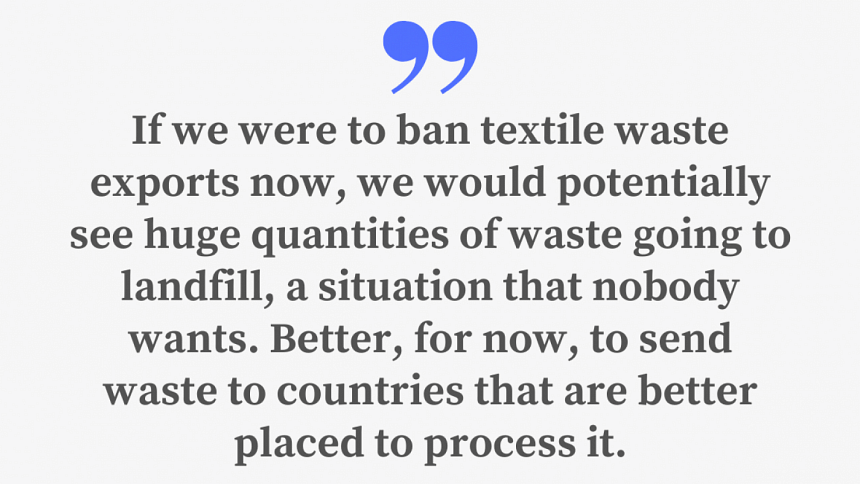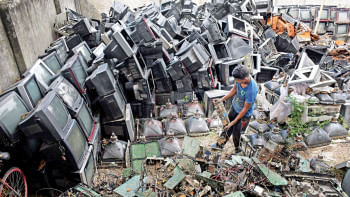Talk of banning textile waste raises key questions for Bangladesh

Bangladesh, the second world's largest exporter of garments, needs to have a long conversation about recycling. Just recently, the Bangladesh Textile Millers Association (BTMA) requested that authorities ban the export of garment waste in order to preserve raw materials for native recyclers. It was claimed that capacity building efforts across Bangladesh are supporting companies as they look to accommodate greater streams of textile waste.
The BTMA is even calling for the withdrawal of VAT which, in some cases, makes importing recycled fibres cheaper than trade on the domestic market.
In theory, this sounds like a good idea, but it is not so straightforward. It would appear to make perfect sense for Bangladeshi garment-makers to better utilise waste rather than send it abroad. However, recyclers primarily use pure cotton waste and simply lack the capacity or technical know-how to process tricky fibre blends, non-woven items and other complex waste types.
Common Objective (CO), a UK-based global tech solution for sustainable fashion business, estimated that 62 percent of all fibres used in the fashion industry are made from a synthetic material – mainly polyester, but also nylon, acrylic, polypropylene and elastane. While cotton use stands at 24 percent, this will be blended and not 100 percent cotton. At the same time, synthetic fibre consumption is said to be growing globally, at around 7.39 percent.
If we were to ban textile waste exports now, we would potentially see huge quantities of waste going to landfill, a situation that nobody wants. Better, for now, to send waste to countries that are better placed to process it.
This issue is not unique to Bangladesh. In fact, if one looks around the world at textile recycling, the most common textile waste being recycled are pure cotton items. White sheets from hospitals and hotels, for instance, are an excellent feedstock for recyclers.
It is something of a myth and slightly misleading that clothing is becoming part of the "circular economy" – at present anyway. At best, the vast majority of excess clothing heads to second hand markets, often in countries in Africa. Countries such as India and Pakistan are also way more advanced than Bangladesh in the mechanical recycling of textile fibres.
Nevertheless, we do need conversations around this. A few things need to be brought out into the open. Our ready garment industry generates huge quantities of pre-consumer textile waste each year. The sheer scale of this issue alone should give us pause for thought. How much of this precious resource is being reused or recycled? How much is being exported to other countries? How much of it is being incinerated or landfilled? We need better data on these issues.

In fact, there is an opaqueness generally when it comes to textile waste. The informal sector of textile waste globally is a bit of a mystery, and Bangladesh is no exception. This is the issue which people do not like to talk about publicly.
There are several reasons why this needs to change. The first is regulation. It was recently reported that one of our major European markets was planning to map all of its used clothing and textile waste streams. Regulators there want to know precisely how much clothing is sold in the domestic market, and how much clothing sent to that country cannot be sold in shops.
All around the world, regulators are looking closely at these issues and this has implications for fashion brands, our customers. They are under pressure to lift the lid on their production levels and, who knows, that may soon include supply chains. How much waste is in their supply chain? How much excess inventory is there?
For regulatory reasons such as this, Bangladesh needs to get better at accounting for garment production. How many garment makers are there, how much waste are they producing, and what is happening with it all? There are valid reasons for having complete transparency on these issues.
The second reason we need to tackle this issue is, obviously, environmental. It pains me to learn that Bangladesh produces large quantities of pre-consumer textile waste. This suggests our industry is not as efficient as it could be, and surely leaves room for improvement. Moreover, it cannot be of benefit to the environment to have a sector that is producing so much excess, especially at a time of dwindling global resources (and not to mention rising raw materials prices).
For instance, the fact there is ever growing strain on the production of cotton globally – drought wiped out more than a fifth of Pakistan's cotton crop in 2022 – offers further evidence that we should be better managing and making use of raw materials inputs. Cotton, remember, is the main feedstock into Bangladesh's garment industry.
The final point I want to raise is about skills, learning and technology. It is widely accepted within our industry that textile recycling is one of the foremost opportunities of our time. Every single major fashion brand has its own strategy on textile circularity, and there are numerous industry initiatives on this.
With this in mind, surely Bangladesh should put huge resources into supporting these efforts. By this I mean investment in technology and people. Are our universities and colleges training future industry entrants in textile recycling? If not, why not? What efforts are we making to capacity build in the area of chemical textile-textile recycling? This is where textiles are broken down into their original building block monomers for the production of new clothing. There are huge opportunities in this area.
Playing a leadership role in this area could also bring financial benefits. There is plenty of grant funding available within major global bodies at the moment, all with a focus on sustainability. As a developing country, Bangladesh would surely be a worthy recipient of such funding, especially if this were to support work to future-proof our main export market by making it a global leader in recycling.
We must grasp this nettle in 2023 before a competitor does.
Mostafiz Uddin is the Managing Director of Denim Expert Limited. He is also the Founder and CEO of Bangladesh Denim Expo and Bangladesh Apparel Exchange (BAE).

 For all latest news, follow The Daily Star's Google News channel.
For all latest news, follow The Daily Star's Google News channel. 







Comments